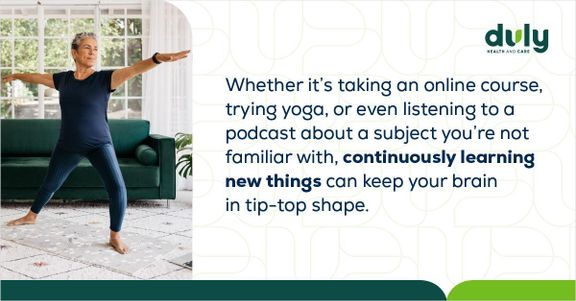When you were a kid, you may have made fun of your grandparents for always losing their keys or mixing up everyone’s names. But now that you’re getting older, misplacing things and forgetting names from time to time might not be so comical.
Many older adults experience some level of cognitive decline as they age, like taking a longer time to remember words or becoming a bit forgetful. As you get older, certain areas of your brain — including ones that are involved in learning and memory — start to shrink.
Communication between nerves in the brain can weaken, and blood flow within your brain can decrease. These changes can then affect how you function, leading to those normal changes in cognition that come with aging.
In an effort to minimize these effects, many people have turned to puzzles like crosswords and Sudoku. Others go to the gym on a daily basis or try eating “brain food.”
So, what is the key to keeping your brain sharp as you age?
Don’t Put All of Your Eggs in the Sudoku and Puzzle Basket
The experts have mixed opinions on the power of puzzles.
A large 2019 study from the United Kingdom found that adults ages 50 and older have better attention, reasoning, and memory the more often they play puzzles like Sudoku or crosswords.
According to the study, among people who play word number and word puzzles, brain function is equal to 8 years younger than their age when it comes to short-term memory, and 10 years younger than their age when it comes to grammatical reasoning.
It sounds promising, but not everyone agrees. Some scientists believe that puzzles may help you concentrate for a couple of hours, but they won’t have any long-term effects on your brain.
Researchers from Scotland have suggested that puzzles don’t prevent cognition loss, but they may put people’s brains at a higher starting point — it takes more age-related stimuli for puzzle players to begin the natural cognitive decline that comes with getting older than it takes for people who do not play puzzles.

Treat Your Brain Like You Treat Your Heart
By addressing certain risk factors for heart disease and stroke, you may also decrease your risk for dementia — such as difficulties with memory, thinking, problem-solving, and making decisions that interfere with your everyday life.
Research has shown that at least 40% of dementias could potentially be delayed or completely prevented by doing so.
Steps you can take to protect both your heart and your brain may include:
Lowering your blood sugar, cholesterol, and blood pressure
Getting enough sleep (most adults should get about 7 to 9 hours per night)
Following a heart-healthy diet that includes plenty of fruits and vegetables, whole grains, and lean meats, and limits unprocessed foods, added sugars, salt, and alcohol
- Staying physically active
At least 150 minutes each week of moderate-intensity physical activity, like brisk walking or ballroom dancing, OR at least 75 minutes each of week of high-intensity activity, like swimming laps or running
At least 2 days each week of moderate- or high-intensity muscle-strengthening activities, like lifting weights
Quit Smoking — Even If You’ve Smoked for Your Entire Life
Giving up smoking is so important for preventing dementia that it deserves a little extra attention.
You’re probably aware of some of the biggest risks of smoking cigarettes — lung cancer, heart disease, stroke, etc. If those warnings haven’t been enough to motivate you to quit, add another risk to the list: dementia.
Current smokers are about 30% more likely to develop dementia — and specifically, about 40% more likely to get Alzheimer’s disease.
The more you smoke, the greater your likelihood of developing dementia. Your risk increases by 34% for every 20 cigarettes smoked each day.
Globally, about 14% of cases of dementia may be due to smoking.
However, even if you have smoked for years, it’s not too late to quit. In fact, a 2019 study found that the higher risk of dementia among smokers decreases gradually from the time a person quits. After 9 years, their risk is no different than the risk among people who never smoked.
Small changes to your health can have a big impact on your brain. Let your Duly primary care provider help you get started.
Find Primary Care near you >
Stay Social
Building and maintaining social connections can go a long way in protecting your brain health:
Loneliness is a risk factor for dementia — and may be associated with as much as a 40% increased risk
Participating in productive, meaningful activities along with others can improve cognitive function
People with more active social lives tend to have slower decline in memory
The benefits of staying social go beyond brain health — people who have stronger social connections have been shown to have better health and well-being, and even a longer life expectancy.
Also read: Growing Old Gracefully: Steps You Can Take Now That Will Keep You Feeling Your Best as You Age
Keep Up With Your Primary Care Provider
When you take care of your body, you’re taking care of your brain. Medical conditions from diabetes to depression to head trauma can increase your risk for dementia or other problems with cognitive functioning.
See your primary care provider on a regular basis, and let them know right away if you have any health concerns so that they can work with you on keeping your health in check and your brain sharp.
Whether you’re looking to be proactive about brain health or have noticed changes that concern you, talk with your primary care provider about what you can do today to protect your tomorrow.
Find Primary Care near you >
Health Topics:








